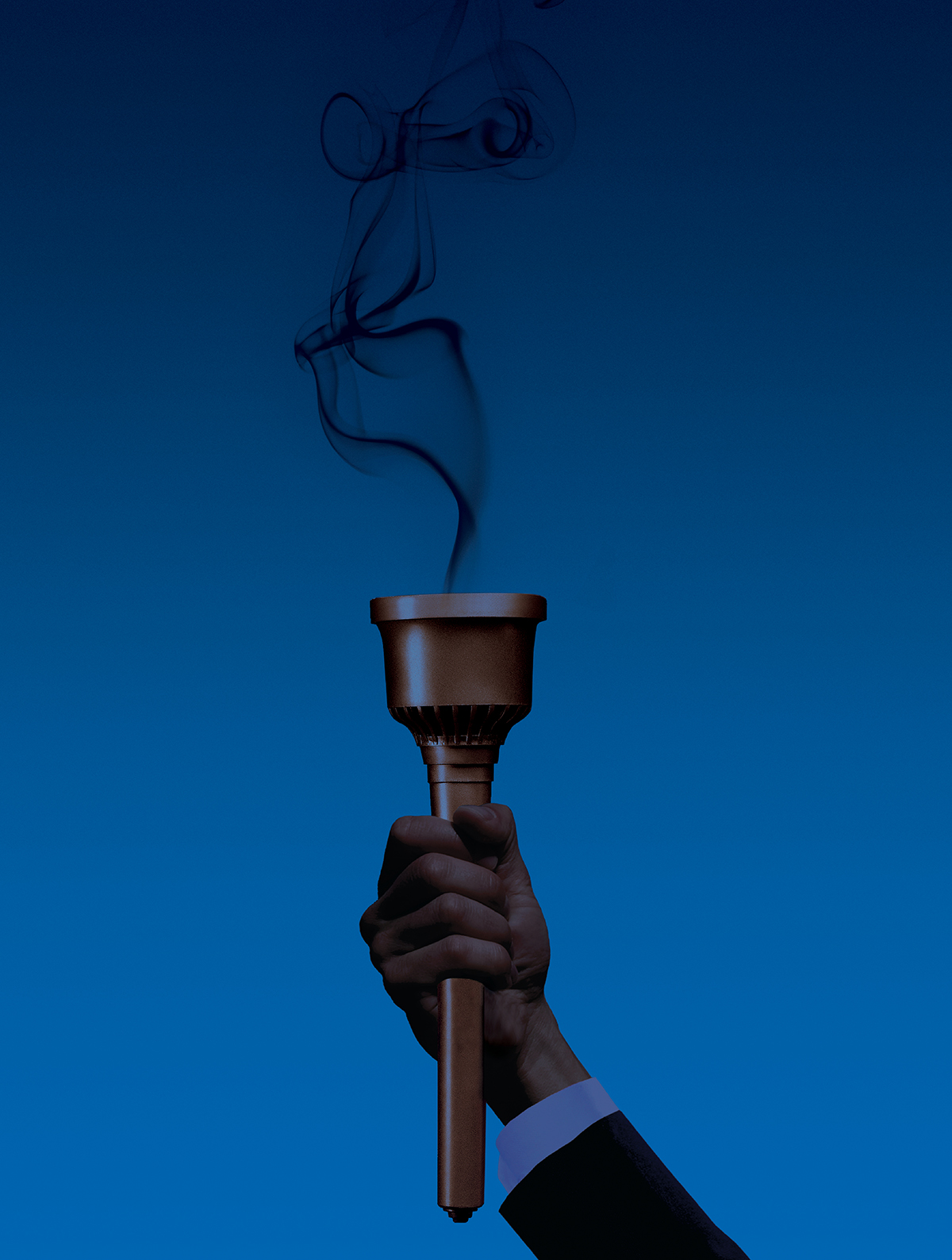How Boston’s Olympic Dreams Flamed Out
In four short months, construction magnate John Fish went from Olympics hero to sitting on the sidelines. The inside story of how it all fell apart so quickly.

Illustration by Ji Lee
From his expansive fifth-floor Roxbury office, John Fish looked out at the Boston skyline in the early-morning hours of January 8, 2015—decision day for the U.S. Olympic Committee—and saw a city with his fingerprints all over it. From the 60-story Millennium Tower at Downtown Crossing to the Mandarin Oriental on Boylston Street, where Fish lives in a $7 million, 4,700-square-foot luxury condo, he’d spent his lifetime building much of the city’s past and present.
Dreaming big had clearly paid off. Head of the $2.5 billion-a-year Suffolk Construction company, he’d collected all the trappings of the wealthy, including a twin-jet Gulfstream IV, a seven-bed, 10-bath mansion on four wooded acres in Milton worth nearly $6.5 million, and a $3 million oceanside home in the Oyster Harbors Club on Cape Cod. In 2006, Boston ranked Fish 33rd on its list of “Top 50 Wealthiest Bostonians,” with an estimated net worth of $425 million. But those were just things. Fish had always been far more interested in ideas, power, and, more recently, building Boston’s future.
From his perch in Roxbury, Fish can see to the Back Bay, where on the top floor of a glassy office building, the Massachusetts Competitive Partnership (MACP) meets six times a year to discuss the state’s issues and give business a voice in politics. Cofounded by Fish, the group of 16 top executives lobbies the State House and regularly speaks with the governor, the House speaker, and the Senate president. Just to the east sits City Hall, where Fish long had the ear of his close friend, the late Mayor Tom Menino, and where he still speaks frequently with Mayor Marty Walsh. And half a mile from there, Fish could clearly make out the ladderlike Atlantic Avenue offices of the Federal Reserve Bank of Boston, where he serves as deputy chair and will likely become chairman. Though he insists he is not interested in public office, Fish is still routinely described as the city’s most powerful person, including by this magazine.
Heir to Jack Connors, a former advertising mogul at Hill Holliday, longtime Democratic backer, and champion for business interests on Beacon Hill, Fish—a former chairman of the Greater Boston Chamber of Commerce—has become a de facto spokesman for Boston’s business community. At 55, he has built himself into a victory machine of almost freakish intensity. When he arrives at work every morning at 4:30 a.m., the first thing he sees is the plaque above his office door that reads, “Winning isn’t normal”—a daily reminder to the former high school football player that success comes from hard work. To cram more hours into the day, Fish has been known to fly his private jet to California, take advantage of the three-hour time difference to work and dine with clients, and then fall asleep on the plane ride home. “I meet a lot of very type-A people,” says Paul Grogan, president and CEO of the Boston Foundation. “He’s in a category by himself.”

photograph by christopher churchill
But as Fish looked out at the city he built, he also eyed dark clouds on the horizon. Fish sees a Boston whose two biggest economic drivers—elite education and world-class medicine—are vulnerable. Economics experts predict that the astronomical growth in the cost of a college education is unsustainable, and that out-of-control healthcare costs are creating a bubble—one that, should it burst, would hit harder here than almost anywhere else. Boston’s business and development community is still scarred from the financial and housing collapse seven short years ago. He wants a more diverse local economy—and for the city to think strategically about its growth.
Fish already knew the numbers: There is not enough housing in Boston. He’d been traveling the state arguing the need to “unlock the value outside [Route] 128” by creating housing and jobs outside Boston’s outer ring and making it easier for commuters to get in and out of the city. He dreamed of new housing in the exurbs and high-speed rail service to Springfield, where homes cost nearly $350,000 less, on average, than in Boston. His vision was big and bold—one that required investment, politics, and charm. But it also needed more than that: For decades, politicians had come to similar conclusions—but lacked the political firepower to convince statewide officials and voters who were still suffering from Big Dig sticker shock. To put his plan in motion, Fish would need to do something different. In the 2024 Olympics, he seemed to have found an unexpected lever of power. And now, having found that lever, he pulled with all his might: He courted the world’s brightest spotlight and set out to reimagine Boston as an Olympic City, selling the $9 billion Olympic effort as a way to generate a momentous deadline for Massachusetts to confront its crumbling transit system and ever-spiraling housing crisis. He drew longtime friends and colleagues to his side; he became the linchpin in a public-private partnership that he promised would deliver a new model for the Olympics, one that wouldn’t produce catastrophic civic debt or sprawl out of control. He courted the city’s and state’s top executives, rallied the MACP’s corporate soldiers, and invested millions in a dazzling presentation that he was sure would sell the public on the dream of an Olympic City.

